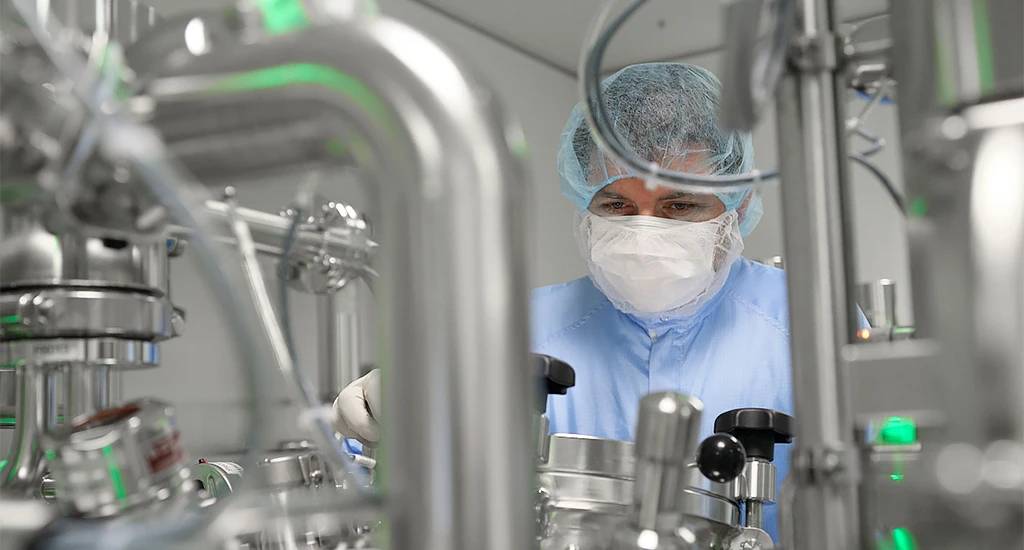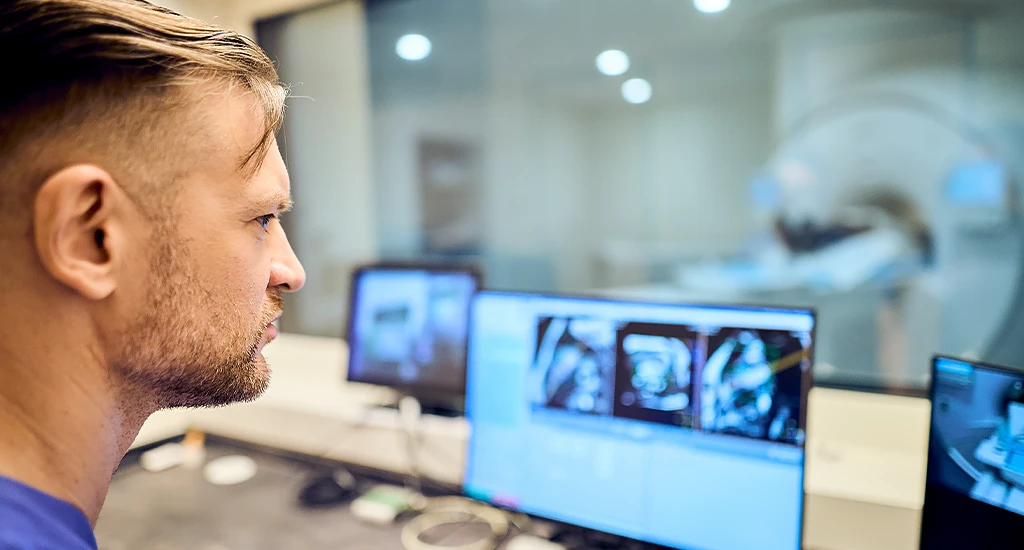Dear Shareholders,
2024 was a dynamic and successful year for Fresenius. More than 176,000 colleagues have made Fresenius more innovative, more focused, and more efficient. This is an outstanding team effort, and millions of patients worldwide benefit from it. Today we are concentrating on our central task more than ever before: To save and improve people’s lives.
#FutureFresenius makes Fresenius more innovative, more focused, more efficient
Our #FutureFresenius program, which we launched at the end of 2022, is paying off. We have successfully completed the Revitalize phase. In 2024, we achieved our twice- upgraded outlook.
- Group revenue before special items increased in 2024 to €21.5 billion, with organic revenue growth of 8%. We have thus significantly increased the pace of growth since the launch of #FutureFresenius.
- Operating earnings (EBIT) before special items rose by 10% in constant currency to €2.5 billion. We have also significantly improved the EBIT margin in the last two years.
- At €2.4 billion and an increase of 16%, operating cash flow was excellent.
- We reduced the net debt by around €2 billion. Our leverage ratio, i.e. the ratio of net debt to EBITDA, was thus the lowest it has been in seven years. It lay at 3.0x at the end of 2024. This is important because we are still operating in an environment of higher interest rates. This lower debt level will allow us greater financial – and thus also strategic – room for maneuver.
Growth, higher margins, more cash, lower debt – all this has created value: From the beginning of October 2022, when we prepared the Reset, until February 28, 2025, the share price rose by 76%. This means that we have significantly outperformed the benchmark index STOXX® Europe 600 Health Care, which rose by 27% over the same period.

Significant value creation through transformation
We propose a dividend of €1.00 per share for the 2024 fiscal year. We were legally obliged to suspend dividend payments in the 2023 fiscal year due to the acceptance of the German federal government’s energy relief payments.
» Today we are concentrating on our central task more than ever before: To save and improve people’s lives. «
Going forward, Fresenius will pay out 30% to 40% of its Group core net income, excluding Fresenius Medical Care and before special items, as dividends. Our new dividend policy is designed to ensure attractive shareholder returns while at the same time providing strategic flexibility.
The “new” Fresenius is much more focused. We are focusing on the business at Fresenius Kabi and Fresenius Helios. These are growing profitably and under their own steam. The deconsolidation of Fresenius Medical Care in 2023 was a decisive step towards more focus. Fresenius and Fresenius Medical Care have both benefited from this. In December 2024, Fresenius Medical Care returned to the DAX 40.
In March 2025, we announced that we would reduce our stake in Fresenius Medical Care from 32.2% to 25% plus one share. We intend to hold 25% plus one share in Fresenius Medical Care, thus underlining our continued commitment. We will remain by far the largest shareholder and will continue to actively support the management board of Fresenius Medical Care through our two representatives on the supervisory board. We will use the proceeds of €1.1 billion in line with #FutureFresenius and our stated capital allocation priorities. The aim is to further strengthen the balance sheet, to reduce leverage, and to deliver long-term growth, innovation, and shareholder value. The necessary exit from our Vamed businesses is another important strategic step to streamline our portfolio.
» The ‘new’ Fresenius is considerably more focused. We are concentrating on Fresenius Kabi and Fresenius Helios. Both are growing profitably and under their own steam. «
We have focused our business with three platforms for the therapies of the future: the specialized (Bio)Pharma platform, the targeted MedTech platform, and the holistic Care Provision platform. With a combined market potential of up to €1 trillion and strong growth momentum, they are also economically relevant. We are aligning and further developing our portfolio with these three platforms.
Fresenius Kabi delivers strong performance
The Vision 2026 strategy launched at Fresenius Kabi in 2021 with a focus on three growth vectors and the volume business with generics is also paying off. The growth vectors are Biopharma, MedTech, and Clinical Nutrition, and are the biggest value drivers at Fresenius.
Highlights at Fresenius Kabi in 2024:
- Our generics business is allowing us to supply many people with vital and affordable medicines. In Europe, we added Lacosamide, a generic drug for the treatment of epilepsy in intensive care medicine, for example. In the United States, we launched five new generics in the fourth quarter alone. We want to increase the pace of market launches in the current fiscal year compared to 2024.
- Biosimilars are biologically produced drugs that are highly similar to an original biologic medicine. A range of Fresenius biosimilars are already on the market – among them is Tyenne®, which is the first tocilizumab biosimilar. It is used in the treatment of several inflammatory and immune diseases. Further attractive biosimilar developments are in the pipeline. In 2024, the biopharma business grew in constant currency by 76% and achieved revenue of around €600 million. We expect it to exceed the €1 billion mark in the coming years. In terms of scaling and costs, our majority stake in the mAbxience production and development platform is an important competitive advantage.
- At the same time, we have been able to continuously expand our range of clinical nutrition products. Our leading position in parenteral and enteral nutrition and product innovations make me confident that we will continue to develop this attractive business. For example, we have launched Peditrace Novum in Europe, which is our parenteral micro-nutrient supply in pediatrics.
- We have strengthened our medical technology business by cooperating with leading companies and investing in state-of-the-art production technologies. An important product in our portfolio is our Ivenix Infusion System. We already have more than 10,000 Ivenix Large Volume Pumps in use in the United States, including in some of the country’s most renowned hospitals.
Digitalization is becoming increasingly important at Fresenius Helios
Fresenius Helios is expanding its role as one of Europe’s leading private hospital chains. Many of our clinics rank among the best hospitals. Patients give us top marks for the quality of treatment.
Some of the highlights at Fresenius Helios:
- The Quirónsalud clinics in Spain offer a thoroughly digital patient journey – from making appointments to aftercare. Spain is a pioneer in digital healthcare in Europe, and we are pioneers in Spain. Patients check in at our clinics as if they were at the airport, using a tablet and app to view their treatment pathway. Immediately after the examination, they receive the results electronically and can also communicate with the medical team. This is made possible by our digital hospital and patient platform Casiopea.
With more than seven million users of the patient app, Casiopea is already widely used in Spain. - AI applications are already part of everyday clinical practice, and their role will increase. Examples include the AI-supported analysis of images during colorectal cancer screening, preparation of medical reports, and recording of doctor-patient discussions via voice recording. AI is used at Quirónsalud in Spain and the Helios clinics in Germany.
- We are also investing in new hospitals. One example here is the opening of the Helios HSK Kliniken in Wiesbaden, Germany. This maximum care facility is one of the most modern hospitals in Germany and treats more than 175,000 patients annually.
Responsibility for people and the planet
Without people, the future of medicine will not be possible. And healthcare is a team effort. Strategic personnel development is therefore crucial to Fresenius’ future success. With a training ratio of almost 8%, we are one of the largest training companies in Germany. In 2024, Fresenius employed around 6,800 apprentices and dual study students. Future technologies such as AI and fields like data science form an integral part of our training programs.
» Without people, the future of medicine will not be possible. «
We always have our planet in mind in everything we do. In 2024, we published our first Sustainability Highlights Report. On a newly appointed Sustainability Advisory Board, four renowned international experts from the fields of science, business, and consulting have been supporting us for the past year in the further development of our sustainability strategy. We are on course to halve our CO2 emissions by 2030 and be climate-neutral by 2040. We reduced our Scope 1 and Scope 2 emissions, i.e. direct and indirect emissions from purchased energy, by 27% in 2024 compared to the 2020 base year. We want to also better manage our Scope 3 emissions, i.e. from our supply chain, in 2025 and thus reduce them, too, in the long term.

In 2024, we also updated our brand identity, modernized the Fresenius logo, and introduced our Committed to Life brand claim. The response to our new image has been very positive. So we are entering 2025, our anniversary year, with confidence. It is the year in which Else Kröner would have celebrated her 100th birthday. The foster daughter of company founder Eduard Fresenius played a major role in transforming Fresenius into the world-class healthcare company that it is today. Her legacy is the relentless pursuit of medical progress and corporate social responsibility.
Healthcare as a leading industry for Germany and Europe
2025 will be a year of great geopolitical uncertainty. The old world order is disappearing, and a new one is beginning to take shape. Trade and economic relations are changing rapidly, and with them the balance of power. Europe must step up if it wants to keep up with the United States and China.
» The biopharma, medical technology, and clinical nutrition growth vectors are the biggest value drivers at Fresenius. «
Since there are currently a lot of discussions about Germany’s competitiveness as the largest economy in Europe: I think Germany is a turnaround story. However, the new federal government must make the economy its top priority to achieve a successful turnaround. Prosperity arises from competitiveness. To achieve this, we need an ‘Action Plan’ for Germany that strengthens economic power and makes Germany a future-proof location.
The healthcare industry can play an important role in an economic recovery as a strategic leading industry. It already accounts for almost 12% of the gross value added and employs more than 8 million people in Germany. It is an innovative and growth-oriented industry. I firmly believe that its potential has not yet been fully realized and that Germany can once again become the pharmacy of the world if we take the right approach. This would involve an industrial framework that brings production back to Germany and Europe, scaling innovation, limiting bureaucracy to what is necessary, and using the possibilities of digitalization and AI for quality and efficiency leaps. This will enable us to ensure the highest level of care. And patients will benefit from it.
Focus on continuous value creation
We have now successfully completed the Revitalize phase of #FutureFresenius and initiated the Rejuvenate phase. The first visible step in this new phase is the reduction of shares in Fresenius Medical Care. We are not standing still – we are moving up to the next level of performance! We are setting ourselves higher targets while further reducing our debt. We will see further product launches and improvements in patient care across our platforms. At Fresenius Kabi, we have raised our margin targets, driven by performance improvements and the growth contributions from our Biopharma business. At Fresenius Helios, a dedicated program will lead to productivity gains and a stronger positioning, while reaffirming our commitment to high-quality care.
The Fresenius Financial Framework remains an important steering tool. We have upgraded some of the financial targets:
- The structural margin ambition for Fresenius Kabi was raised to 16% to 18% (previously: 14% to 17%)
- We have lowered our self-imposed leverage target corridor to 2.5 to 3.0x net debt / EBITDA (previously: 3.0 to 3.5x)
- We would like to introduce an attractive new dividend policy
For the Fresenius Group, we expect organic revenue growth of 4% to 6% and constant currency EBIT growth in the range of 3% and 7% before special items in 2025.
Dear Shareholders,
We will make Fresenius more innovative, further digitalize our operations, and contribute to a sustainable ecosystem for health data. All of this will lead to continuous value creation. We will continue to pursue the #FutureFresenius path. We are relevant to society – and will remain relevant.
On behalf of the Management Board, I would like to thank all our colleagues for their excellent work. My thanks also to the Supervisory Board and the Else Kröner-Fresenius Foundation for supporting our progress. I would also like to thank you for your trust. I look forward to talking to you in person at our Annual General Meeting in Frankfurt am Main on May 23, 2025.
Until then, I remain cordially yours,
Michael Sen
Chairman of the Management Board



